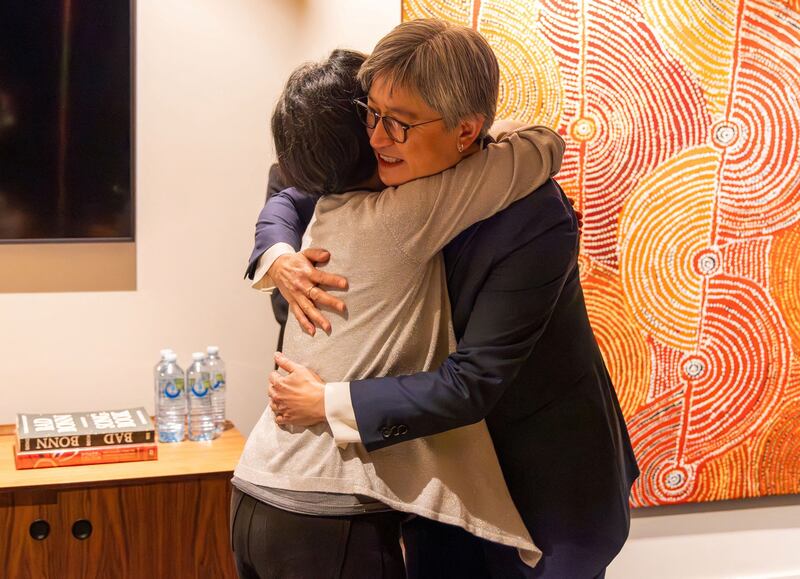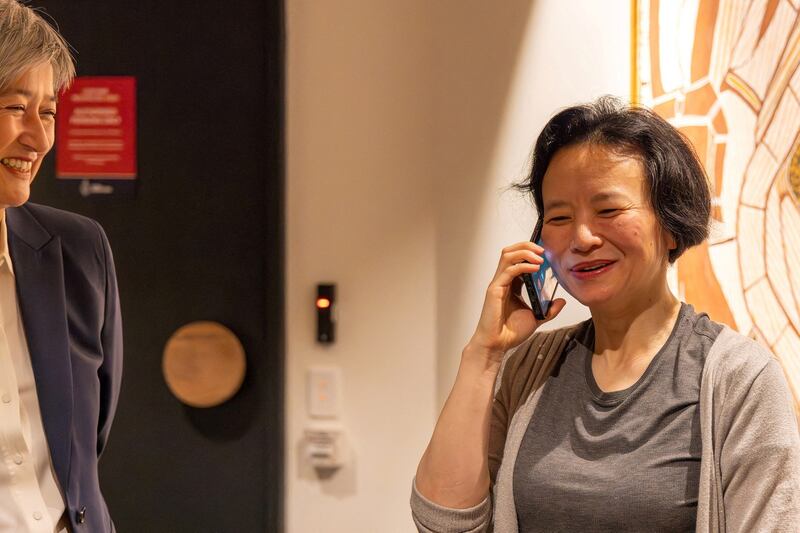Australian national and former Chinese state TV anchor Cheng Lei was reunited with her family on Wednesday after her release from a three-year prison sentence for "spying," according to her first social media post in three years.
“Tight hugs, teary screams, holding my kids in the spring sunshine," Cheng wrote on the @FreeChengLei X account. "Trees shimmy from the breeze. I can see the entirety of the sky now! Thank you Aussies."
Her post was in sharp contrast to an earlier statement Cheng released from prison, in which she wrote about being cut off from the natural world.
"I miss the sun. In my cell, the sunlight shines through the window but I can stand in it for only 10 hours a year," Cheng wrote. "I haven't seen a tree in three years."
Cheng, 48, was detained on suspicion of "spying" in August 2020, and was held incommunicado for more than 18 months, including under " residential surveillance at a designated location."
Her detention came amid increasingly strained ties between Beijing and Canberra, which has taken steps to limit the Chinese Communist Party's influence in the country, barring Chinese telecoms giant Huawei from bidding for 5G mobile contracts.
Cheng stood trial at the Beijing No. 2 Intermediate People's Court on March 31, 2022 amid tight security, but her sentence was never publicly announced.

China's Ministry of State Security, making public the details of her case for the first time, claimed that Cheng Lei "illegally provided state secrets she acquired at work to overseas institutions," committing the crime of "illegally providing state secrets to overseas parties."
In a statement posted to its official account on Weibo, it said Cheng was sentenced to two years and 11 months in prison, then deported after completing her sentence.
"In May 2020, Cheng Lei was coaxed by personnel from an overseas agency and, in violation of the confidentiality clause signed with her employer, illegally provided state secrets she acquired at work to the overseas agency through her mobile phone," the statement said.
"Cheng ... truthfully confessed to the facts of the crime and voluntarily pleaded guilty and accepted punishment," it said.
Australian Prime Minister Anthony Albanese said his government had been working for Cheng's release "for a long period of time and her return will be warmly welcomed not just by her family and friends but by all Australians."
"She is a very strong and resilient person," said Albanese, who said he has spoken to Cheng and welcomed her home on behalf of the country.
Chinese Foreign Ministry spokesperson Wang Wenbin said the Chinese judicial system tried the case “in accordance with the law, fully safeguarding the rights enjoyed by the person concerned in accordance with the law.”
'A kind of political persecution'
Feng Chongyi, associate professor of Chinese studies at the University of Technology Sydney, said Cheng's release comes amid gradually thawing bilateral ties between Beijing and Canberra, and that her case was entirely "political."
"The information she was handling was news, and no longer confidential," Feng said of the "secrets" Cheng is alleged to have shared with someone overseas.
"Using this to incriminate her isn't in line with common sense ... it was a kind of political persecution," he said.
He said Cheng's release was a gesture of goodwill to Australia, and that she had been used as part of "hostage" diplomacy.
"[This] paves the way for improved economic and trade relations between the two countries," Feng said. "There are geopolitical pressures, because China is very isolated internationally right now."

Cheng was born in the central Chinese province of Hunan and emigrated to Australia along with her parents when she was very young.
At the time of her detention, she was working as a business anchor and reporter for the state-run China Global Television Network.
She was tried behind closed doors in March 2022.
While Cheng was reunited with her family, there has been no news of outspoken Australian writer and political commentator Yang Hengjun since his trial behind closed doors for "espionage" in Beijing on May 28, 2021.
Yang, 54, who also once held Chinese nationality, was detained on arrival at Guangzhou Airport on Jan. 19, 2019, then taken to Beijing by officers of the state security police.
Feng said Yang, who is a friend of his, is suffering from severe kidney disease, and sentencing has been postponed in his case.
Feng has previously claimed that Yang is a former agent of China's state security police, citing a letter Yang wrote to him in 2011, revealing that he had worked for China's ministry of state security for 10 years starting in 1989.
While foreign journalists have long faced challenging conditions under Chinese Communist Party rule, they are also now dealing with growing hostility and intimidation, including online stalking, smear campaigns, hacking and visa denials, journalists' groups have said in recent reports.
Translated by Luisetta Mudie .
